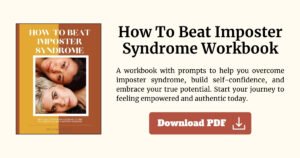Doing What You Truly Value Makes You More Resilient
Every one of us is bound to experience both ups and downs, highs, and lows. It’s part of life. Life is more of a rollercoaster ride than a straight trip across a flat plane. And, after all, isn’t that what makes life interesting? Would the high points seem all that high without the low points to balance them? But the low points can be devastating, and we need the strength to recover and pull ourselves up to the heights once again.. This is what we mean by resilience. Resilience is the ability to adapt at will to trauma, change, adversity, and tragedy. It is what enables us to deal effectively with stress caused by problems with our health, our relationships, or our jobs. We need to be resilient to live and thrive, not merely to survive.
But before you continue you might like to consider our free worksheet on exploring “How To Beat Imposter Syndrome”. Please download this worksheet here.
So, how do we become more resilient? Start by being aware that if we are doing what we truly value in our daily life, we are building up our resilience. Resilience grows the happier and more fulfilled we are in ourselves. If we get bogged down in things and activities that are not important to us, that do not fall into line with our core values and our purpose in life, we are setting ourselves up for failure. We can fall victim to this in many ways. Perhaps we spend more time and effort at our job than we do on our family, even though our family is what we value most. Maybe we have chosen to become a bean counter for a major corporation when what we truly value is art or science. Don’t get me wrong. There is nothing inherently wrong with counting beans or dedicating your life to a job you love. But if these are not your primary value, if they do not bring you joy, then you are opening yourself up to a life more like the boredom of a long, slow train ride than the thrills of a coaster ride.
By dedicating our lives to practices which are at odds with our core values, we open ourselves up to a life of negative emotions. One of the basic tenets of positive psychology is to accentuate the positive. It teaches us to appreciate and cultivate positive emotions. By choosing to live a life out of tune with our core values, we will definitely feel unfulfilled. We will also probably grow to feel more and more lethargic as we give in to the monotony of constantly going through the motions while receiving nothing positive in return. We will become bored and resentful. Eventually, hopelessness will set in, because we can see no corresponding reward for all the effort we have expended. Well, we perceive no reward simply because we do not find anything we do to be rewarding. It does not fulfill us, it does not do anything to enhance our joy or happiness, and it does not fall into line with what we really value. Eventually, it’s highly likely that stress will enter into the picture, and stress is a killer, both emotionally and physically. Such a condition does not bode well for the condition of our resilience, does it? Why would we be motivated to recover from setbacks, to overcome obstacles, when we can see nothing but the same on the road ahead of us? If we have abandoned our values to settle for a life of unfulfillment and dissatisfaction, why should we strive to overcome momentary problems simply to return to that life? By applying principles of positive psychology, we can turn this all around, learning to deal with the bad things when they happen with a positive attitude.
If you have had enough of that long train ride to nowhere, there is a way to get back on track. It will require a return to a life built on your values and a corresponding growth in resilience. You will find that when life is worth living, when you find it rewarding, you will be motivated by positive emotions to overcome anything which gets in your way. You may find it difficult to be resilient without the motivation of living a more positive life, one deeply connected to your sense of values and purpose. By developing such a purposeful life, you will become more resilient, and the more resilient you are, the more fulfilling your life will be. The two things are mutually dependent upon each other it would seem.
The question is how can you make yourself more resilient? There are several practices that can help you build a better life, one in tune with your values, and with enough resiliency to help you overcome anything that life may throw at you. The rewards are many for those who choose to follow through.
Build, or rebuild connections.
Start by building connections. Prioritize just who is important in your life. Although most people will choose to connect or reconnect with family or friends, remember the importance of forming new connections. Each new connection can help to accentuate a new interest, something which can bring you new experiences and encourage further positive feelings. Join a group of people with shared interests; for example, it could be a local little theater club or a group of sci-fi fans. Take a class you’ve always been curious about, or perhaps join a book club. Gaze at the stars with some fellow astronomy buffs.
Foster wellness
Next, take care of yourself, mentally, emotionally, and physically. Get enough sleep, eat a proper diet, and get out there and exercise. Feeling well physically will lift your spirits, leading to more positive energy. Stress has long been known to cause physical problems as well as emotional ones, so striving to lead a life more in tune with your values will cause a decrease in stress and a corresponding improvement in your physical condition.
Practice mindfulness. Spend some time each day meditating, praying, or simply keeping a journal. Or try yoga. Think about the things in your life which make you happy, and remember everything for which you are grateful. Remember that there has always been some light even in the darkest of times. Look for things that you have been grateful for, even in those periods of adversity.
Avoid escaping your problems through drugs or alcohol. That kind of relief is never a cure, only a temporary solution. It’s like putting a band-aid on a fatal knife wound. Remember, you’re looking to embrace life, not escape it.
Find a purpose
Look for a purpose in life and do something about it. This should be something that fosters positive feelings in yourself. Decide to be more giving. This could mean giving money by contributing to the charity of your choice or giving of yourself through volunteering. Remember that the closer this comes to the core values you choose to live by, the more positive the results will be. Maybe you would like to work at a local homeless shelter or help latchkey kids with their homework at a local children’s’ facility. It could be anything remotely similar. Visiting seniors? Rescuing discarded pets? Whatever makes you happy will enhance your sense of wellbeing and increase your joy in life.
Try to become more proactive. Don’t let yourself be overcome by life, but teach yourself to overcome it. If you’re facing a problem that seems just too big to handle, break the solution down into smaller, more manageable steps. Each small success will help you gain the confidence to move on to the next step, and the next, until you have achieved that final victory.
Set some realistic goals for yourself. Never set yourself up for failure. Ask yourself, “what is the one thing I can do today to help me to move forward on the road to a more successful and fulfilling life”, then do it. If you are struggling with the loss of a loved one, decide to look for a support group. Trying to quit smoking? Get help from your doctor.
Grab every opportunity you can for self-discovery. Look back at your experiences and examine how they have affected you, and how you have grown as a result. Has that loss made you more accepting? Perhaps a struggle with chronic disease has made you stronger. Take note of each circumstance, and study how you can incorporate newly discovered or developed character traits into future circumstances.
Think healthy thoughts
Keep thinking healthy positive thoughts. How you think, affects how you act and, therefore, how you deal with certain situations. Good thoughts promote optimism and success. Keep things in perspective. Not everything is the end of the world, after all. No matter what the challenge may be that faces you, you are not helpless and, while you may not be able to triumph every time, you will learn from the experience.
Learn to accept change as this is an inevitable part of life. Struggling to maintain the status quo will only lead to frustration, resentment, and hopelessness when the inevitable change takes place. Just because some things are beyond your control, doesn’t mean that all things are. The important thing is to know the difference. And if you find that you have fought the good fight, and still come out on the losing side, greet the outcome with a sense of acceptance and gratefulness for lessons learned. Don’t waste effort on things you can’t change but devote yourself to those which can be improved upon.
Maintain a sense of hopefulness. Visualize what you want and try not to worry about what you fear. Learn from what you have accomplished in the past and how you did it. Look forward to what you know you can achieve in the future.
Getting help when you need it is crucial to building up makes you more resilient. Positive psychology can teach you to live a more positive life by following your passion, finding a purpose, and adhering to your core values. All of this will build up a core of resilience so healthy that you will be able to bounce back from anything life throws at you.
If you’re ready to start building resilience by focusing on your core values, purpose, and passions, don’t wait any longer. Download our free Workbook to begin your journey today! Develop the tools to embrace life’s challenges with a positive mindset and become more resilient in the face of adversity.






